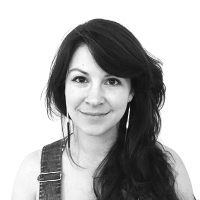
Within your own backyard lies adventure that will transport you to a place that feels miles from home. So leave your passport behind and start exploring The Nearest Faraway Place.
The South is a stifling, uncreative place, said everyone who’s never lived there. Sure, it’s stifling, but only as it pertains to the summer heat. Here, low cost of living and slower pace spawn creative hotbeds. Throw in a few Southern idiosyncrasies and top it off with a powerful vision to drop everything and create art, and you have the birth of Howard Finster’s Paradise Garden: the weird wonderland of one of the most influential, self-taught artists of the 20th century and the grandfather of modern American folk art.
Paradise Garden in Summerville, GA is less that two hours, and perhaps a few turns back in time, from Atlanta. Moments after arriving, my travel partners and I were on Finster’s porch sipping glass-bottled Cokes as the hospitable staff showed us photos of the once mud-and kudzu-covered areas of the garden they carefully excavated. They told us of artwork they’re continuing to uncover each day as the revival effort carries on. Soon, we were immersed in Finster’s world, on the same porch where REM, The B52s, and Keith Haring once sat visiting with the artist.
Built between 1963-1992, then overtaken by nature after Finster’s death in 2001, Paradise Garden was brought back to life by an ongoing restoration initiative in 2012.
“I like to refer to the restoration process as a revival,” says Paradise Garden Director Jordan Poole. “What we are trying to do most is restore the spirit of the place, and that is done with a meld of different takes of preservation philosophy. For instance, one philosopher named John Ruskin was all about beauty in decay. I think that we find our work as both a repurpose of use, such as our visitor center, to the sculptures of bicycle parts that exist in a beautiful decay.”
Finster was upcycling, reclaiming, and repurposing long before they were buzzwords. Marbles, mirror shards, bicycle tires (his vision to begin painting happened in his bicycle workshop), hub caps, shoes, scrap wood, windows and everything in between were sculpted, mosaiced and cobbled into a folk art Camelot. “I took the pieces you threw away, put them together by night & day, washed by rain and dried by sun, a million pieces… all in one!” reads one of the many placards Finster wrote to guide you through the grounds. Bit by bit, Finster built a scene straight out of a long lost True Detective episode or Beasts of the Southern Wild.
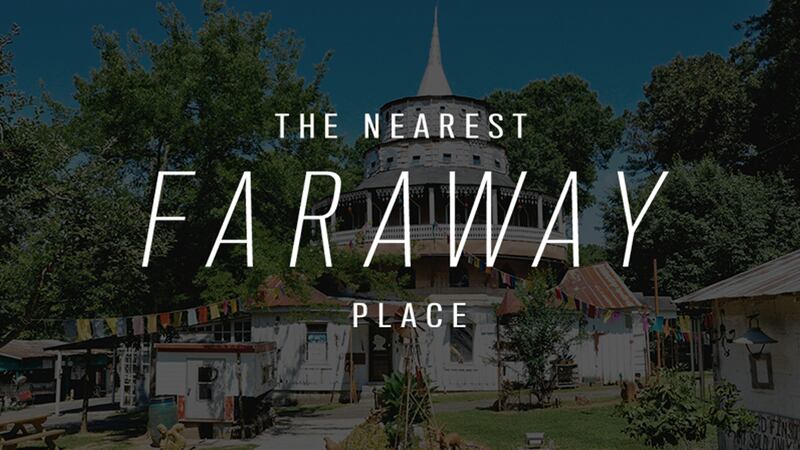
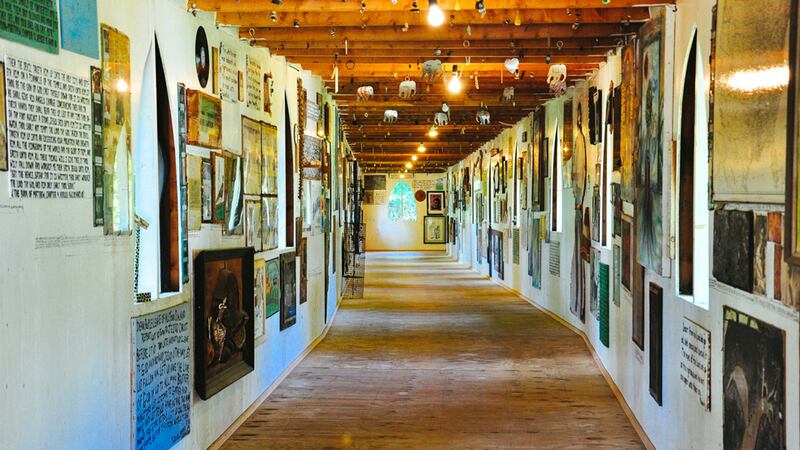
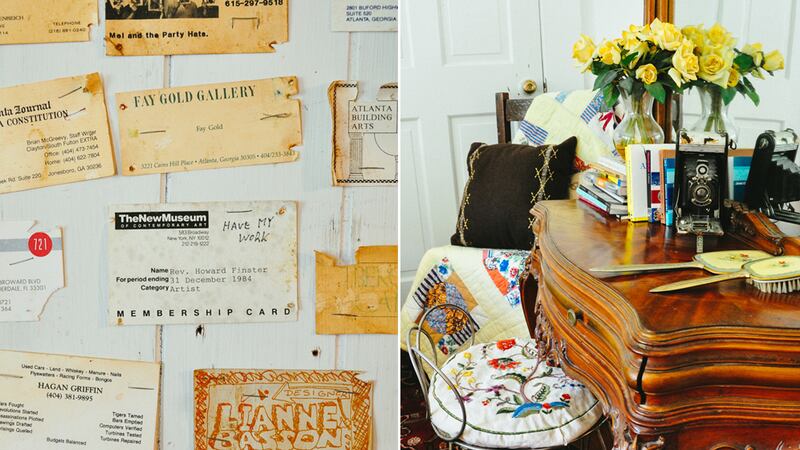
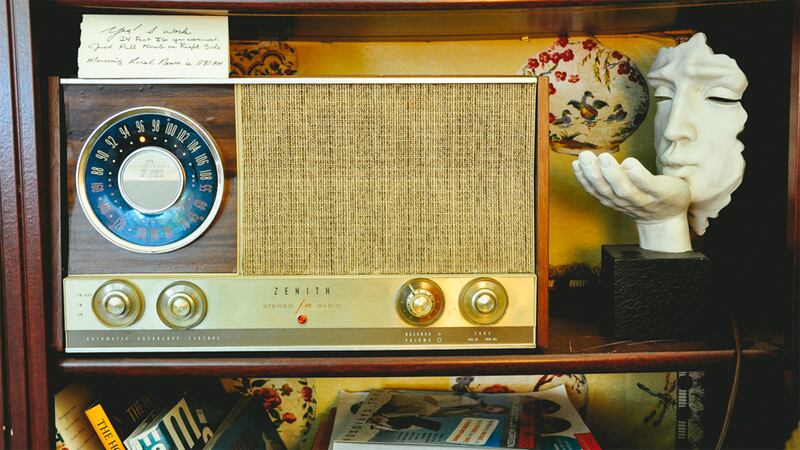
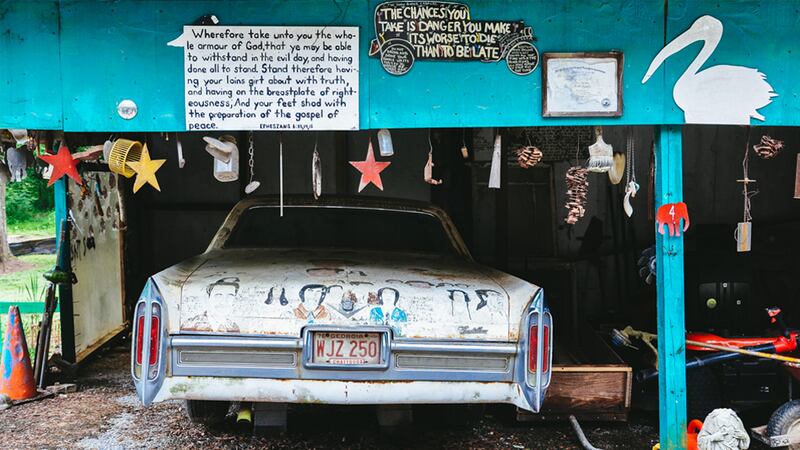
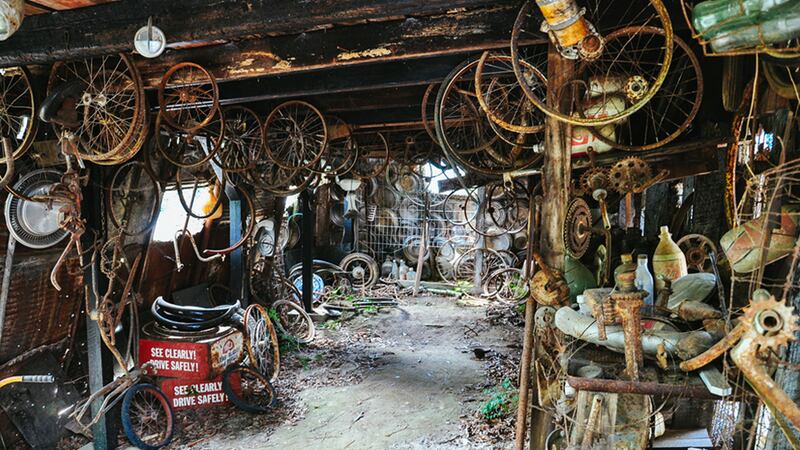
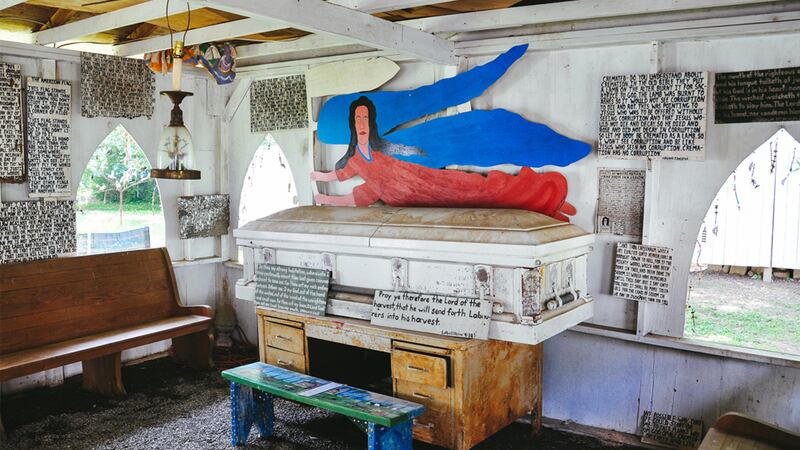
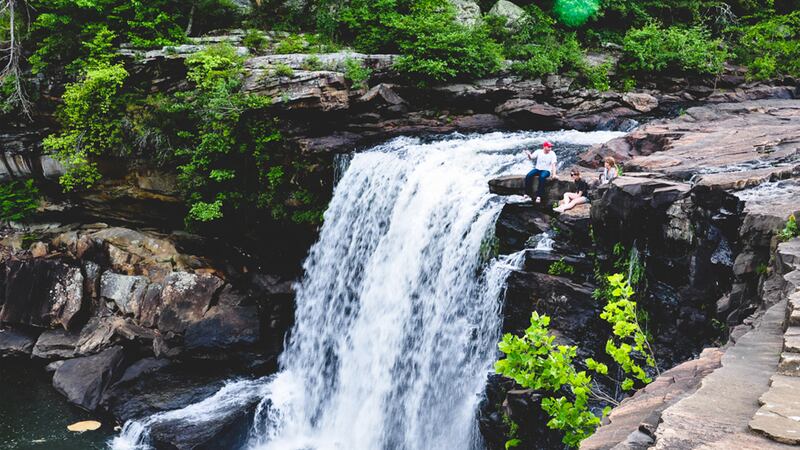
Everything in the garden sparkles. A treehouse, completely mirrored inside and out, presents you with an infinite, tunneled reflection when standing inside. An open-air sanctuary of weathered old church pews provides stillness and shade, neighboring the tomb of an unknown individual. Waterways meander through a garden of sculptures, spires festooned with colorful flags and sheds housing collections of cast-away objects Finster found beauty in.
Paradise Garden is a scrapbook you can walk though. Howard Finster was the chief historian of his own life. A TIME magazine article on his art, a clip of his musical performance on the Johnny Carson show, a gift from a visiting artist, a special rock, and heaps of Polaroids: tokens that entered his life were mounted, labeled with dates and anecdotes, and displayed with pride.
“I began painting pictures in Jan 1976 without any training. This is my painting. A person don’t know what he can do unless he tries. Trying things is the answer to find your talent,” reads one note. Finster’s artistic triumphs, his cover art for REM and Talking Heads albums, his dying wishes, and everything in between are documented in this walk-in journal. A long tunnel of an open air gallery on stilts houses artwork gifts he received and his own personal items and memories, set to a 24 hour looping recording of Finster waxing on spirituality, creativity, heaven and the planets in his Southern mountain accent.
After we explored the gardens, our tour guide Jordan took us to play outdoors at the nearby state parks. As the sun waned, we drove through lush farmland, weaving back and forth over the state border, our phones twitching between time zones. “Only way to know if you’re in Georgia or Alabama is when the pavement changes,” our guide noted. We stopped in nearby Menlo, GA, at an inviting wood-paneled greasy spoon called Bonnie’s Family Restaurant for fried creamed corn nuggets, fried green tomatoes, and deep fried pulled pork—a must in the South, even if it is swimsuit season.
Summerville rests at the base of the Appalachian mountains. The grandeur of Little River Canyon and the stillness of boulder-laden Martha’s Falls felt prehistoric. I scanned the rock bed under my feet, half expecting to find a dinosaur footprint. Kids squealed and splashed with their parents at the foot of the waterfall. Teens dared each other to jump off the high rocks into the swimming hole at Martha’s Falls while our new canine friend, Oscar, kept a watchful eye, panting from the heat. Bugs buzzed and the sun set as our car wound its way back through country roads once part of the Trail of Tears. It was a Georgia summer day, distilled to its purest form.
Sun-tired and happy, after a visit to the only vendor of adult beverages in the county, we retreated to the porch of the artist cottage, the charming Airbnb on the grounds, with a glass of wine soundtracks by the hum of cicadas and bullfrogs. The most beloved amenity of our cozy accommodations was a key to the gardens. At night, the gardens took a new form, full of shadows, reflections, and a few friendly cats. The grounds at night would have felt eerie if there wasn’t such pervasive positivity blanketing it all, as comfortable and inviting as the quilts we returned to for bed.
The next morning when we departed, our host advised us to stop at Armstrong’s BBQ for pie, and Trade Day, the weekly flea market.
On the drive home, I had to recalibrate my brain back to my own corner of reality. When you’re at Paradise Garden, you are in Finster’s universe, a sparkling, eclectic, creative playground far away from the worries and distractions we create for ourselves. Or as he would have said, you’re at a “Vision Vortex,” and “the Friendship Capitol of the World.”

